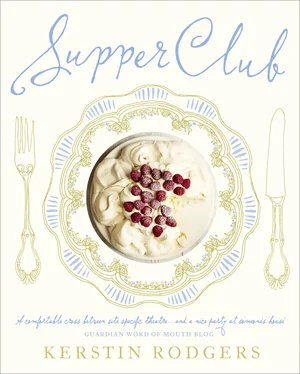One night my dad brought home an entire octopus. He laid out this huge tentacled creature, with its large body full of ink, on the kitchen table. We kids came down to stare at this monster. My dad was excited; my mum left the room, muttering, ‘I’ll leave you to it.’
In those days Google didn’t exist. My mother’s cookbooks didn’t explain how to deal with octopus either. So my dad, a journalist, dealt with this crisis just as he would a story: call an expert, a good ‘source’, and ask them. He phoned Robert Carrier, whom he didn’t know and who was at that time probably the most famous chef in Britain, at his restaurant. In the middle of service. Robert Carrier, a very helpful gentleman, came to the phone and patiently explained to my father how to remove the ink sac, prepare and cook this octopus. He followed the instructions, amazed, despite his habitual cheek (something I seem to have inherited) at getting this help.
Of course, none of us would touch it.
My background is part Italian, part Irish and entrepreneurial to the core. My great-grandmother Nanny Savino had a shop in her Holloway council flat. I loved visiting her; the hallways were lined with bottles of Tizer and R. White’s lemonade, the bathtub with pickled pig’s trotters, the kitchen provided toffee apples and apple fritters and, most excitingly, under her enormous cast-iron bed were rustling brown boxes with the illicit earthy smell of tobacco – Woodbines, Player’s Weights cigarettes and matches. People would come to the door and ask to buy cheap fags from ‘Mary’. Her real name was Assunta but no-one could pronounce it. She came to Britain at the age of 16, before the First World War, from the small town of Minori, south of Naples. During the Second World War, the Italians were our enemies and her radio was confiscated. She wasn’t put in a camp, as several of her sons were in the British army. I never met my great-grandad, but from family stories he seems to have been a skinny man, under the iron fist of my enormous, rectangular, black-clad Nan. They started small businesses: a cart selling home-made ice-cream in the streets of Islington, then an Italian café. Even at the age of 80, infirm with arthritis, Nan was doing business from her house. It’s the Neapolitan way; even today there are independent street-sellers in Naples.
One of my most memorable meals was when I was eight years old, and we drove to Minori to see the Italian side of the family, many of whom lived in caves (the front looked like an apartment but the back was a rocky cave). My father’s godfather turned out to be the mayor of the village. He took us to a darkened restaurant, the best in the locality. The godfather wore a crisp white shirt, a tailored dark suit and gold glinted about his cuffs. The small finger on his right hand had a long, curly, yellowing nail. This was an Italian peasant’s way of saying ‘I don’t have to work the land.’ The waiters lined up as if it were a royal visit. Nobody kissed the godfather’s ring, but that wouldn’t have been out of place.
As we left, my brother piped up:
‘Dad, I like this restaurant, we don’t even have to pay!’

My parents hushed him. A few days later, we were invited to the godfather’s house. We had to climb a small mountain of lemon groves; the lemons were half a foot long, with thick knobbly skins, so sweet you could eat them straight off the plant. I remember being so thirsty as we made our way up the dusty lemon grove. The crickets were deafening and the sun beat down. At the top we were welcomed by the widowed godfather’s two 16-year-old daughters – twins I think – who had made us dinner. This time the godfather was wearing a white vest and blue work trousers. This dinner lasted for hours; they had pulled out all the stops: antipasti, pasta, a seafood course, a fish course, a red-meat course, a white-meat course, salads, vegetables, cheeses, puddings. It was the first time I had cannelloni, large stuffed rolls home-made by the young girls. It was a tremendous feat, this banquet, especially for such young cooks. We didn’t speak Italian (they spoke in dialect) and they didn’t speak English. After a few courses, we were struggling; my brother saved the day by groaning and clutching his stomach. At first the girls found this funny and offered him camomile tea but eventually his cries grew so loud and insistent that we had an excuse to leave.
Looking back, meals like this were the inspiration behind The Underground Restaurant, an attempt to recreate the languorous feasts of the continent. You see, the buzz for me, the shiver up my spine, the ‘Oh wow, this is all worth it’ moment, lies in these words: ‘community’, ‘sharing’, ‘experimentation’, ‘dismantling boundaries’. My instrument is food, that which binds us all (sounds a bit Lord of the Rings, doesn’t it?). We all need to eat. Many of us love to cook.
Feeding is how mothers show their love for their families. It’s how countries and communities and religions and families can identify with each other. Meals are memories, milestones in our lives; the first date, the lover that proposed, the husband that did not return for dinner (in retrospect, the first signs of divorce), the tentative feeding of your baby, the family discussions and rows around the table as the children grow up. Sunday lunch, one of the few remaining meals requiring mandatory attendance for family members, is where you might bring a prospective mate to meet the relatives. When I travel, new tastes and smells are intrinsic in recalling that country. Food divides us too: religions are distinguished via what they will not eat or drink.
My philosophy stems from a punk, do-it-yourself ethic. You don’t need a degree in music to start a band, you don’t need permission from the authorities or a catering-college diploma to start a restaurant. Some of the best chefs are self-taught: Raymond Blanc and Heston Blumenthal are two well-known examples. Sometimes, not having a formal education can help you think differently, laterally.
I had an unusual route into food. I did not go to catering college, I did not do a ‘stage’ at a top restaurant, I have not worked in ‘normal’ restaurants at all. Of course, I got the usual grounding that many receive from their mothers and grandmothers and from the societal expectation that being in possession of mammaries and ovaries should lead inevitably to being in charge of cooking dinner.
I’ve wondered, ‘Why am I doing this?’ Why am I sacrificing my social life (I never go out from Thursday to Sunday nowadays), my living room (life is lived in my bedroom, the living parts of the flat have shrunk to bedsit proportions), my mental health (my daughter says my personality totally changes every weekend; I turn into a stressed-out monster).

But then something like this happens...
One evening, from the kitchen, I heard a glass being clinked in the living room, then quiet. Somebody was speaking seemingly to the entire room.
Agog, I sneaked out to have a look. A young woman was standing up, introducing herself and saying, ‘It’s such a nice atmosphere here and I’d like to know more about the other tables so, if you like, perhaps you could say who you are, what brought you here...’
There was a little silence, then one by one, people started to stand up and say their names, where they came from, how they had heard about The Underground Restaurant.
Читать дальше














